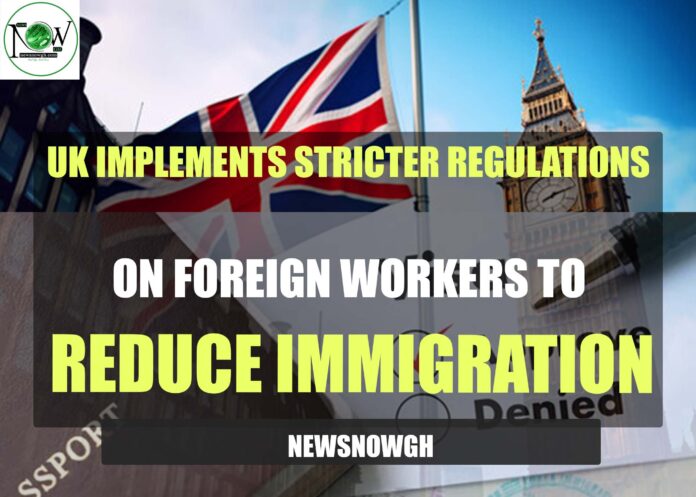UK Implements Stricter Regulations on Foreign Workers to Reduce Immigration
To lessen its dependency on foreign labor, the UK government is putting stronger regulations into place. Healthcare and other industries may experience more workforce shortages as a result of increasing scrutiny of visa sponsorships and stricter pay requirements for skilled worker visas.
The government of the United Kingdom has adopted new regulations aimed at decreasing the number of foreign workers entering the nation. This action is a component of a larger plan to decrease net migration and lessen reliance on foreign hiring in industries where skill from other countries is highly valued.
Key Changes for Foreign Workers
The UK government has raised the minimum income threshold for skilled worker visas, tightened regulations on foreign workers’ visas, and boosted investigations.
1. Decreased Sponsorship of Visas
The UK government has made it more difficult for businesses to hire foreign workers by enacting harsher regulations on visa sponsorship. These modifications restrict access to foreign talent by requiring firms to meet stricter employment requirements to get or keep their sponsorship licenses.
2. Extended Inquiries
Employers who sponsor foreign workers are coming under further scrutiny from UK Visas and Immigration (UKVI). This entails more site visits and in-depth investigations, as well as harsher enforcement of immigration rules through sanctions, including sponsor license suspension or revocation for noncompliance.
3. A Greater Pay Threshold
The UK Skilled Worker visa now requires a far higher minimum salary—£38,700 instead of £26,200. Because fewer lower-paid foreign workers are now eligible for a visa due to this higher threshold, firms are being forced to pay more to recruit talent from abroad.
4. Monitoring by Sector
The UK’s Migration Advisory Committee will keep a close eye on industries where there is a skill shortage and will provide yearly evaluations to inform future immigration laws. This sector-specific monitoring attempts to enforce the government’s reduction of net migration while attending to important workforce needs.
Effects on Social Services and Health
These limits are already having an impact on the UK’s health and social care industry, which has long depended on foreign labor. The number of health and care worker visas granted by the UK in the year ending June 2024 was 89,095, a decrease of 26% from the year before. The number of visa approvals for these workers fell by 81% between April and June of 2024.
The Institute for Public Policy Research’s associate director for migration, trade, and communities, Marley Morris, voiced concerns about these developments. Morris told Reuters that the social care industry is still having trouble filling positions and that the government will need to keep a careful eye on things to prevent another staffing crisis.
Key Sector Monitoring
The UK’s Migration Advisory Committee will keep evaluating industries that are severely lacking in skilled workers. Their annual reports will serve as a roadmap for future immigration policy decisions, assisting ministers in meeting the labor needs of the nation while upholding stringent immigration regulations.
Final Thoughts
Despite their stated goal of lowering net migration, these new regulations may make the labor shortages in vital industries like health and social care worse and make it more difficult for the nation to fill these positions.
Follow us on Newsnowgh.com to stay updated on the latest information regarding work permits, visa application processes, paths to permanent residency, and visa-sponsored employment.


